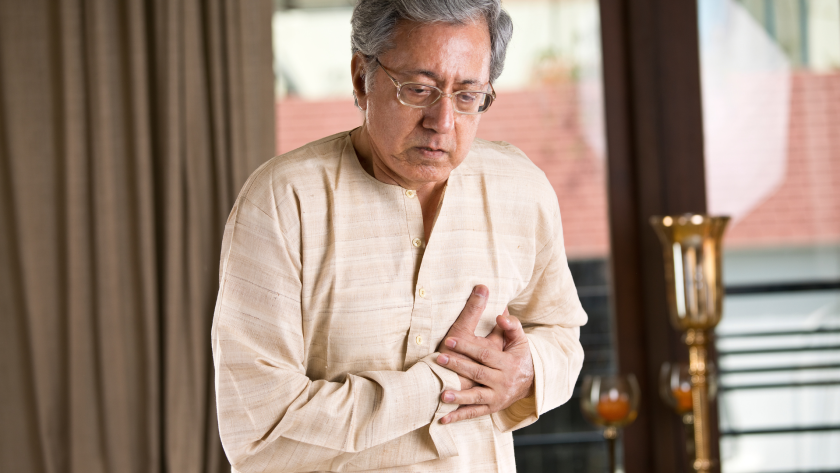Heart disease is a serious business. It kills more people than cancer, diabetes, and stroke combined. Yet, most people know very little about it. In fact, many people know the symptoms and treatments for specific conditions like stroke and heart attack but are unaware of others.
Heart attacks are scary. Even scarier is learning that you may be at risk for one. Most people who have a heart attack know something is wrong. It’s often a crushing feeling of dread, shortness of breath, or crushing pain in the left arm, back, jaw, or stomach. But people often mistake these symptoms for heartburn or anxiety, and by the time they see their doctor, it’s too late.
Many may be aware that they’re at risk for heart disease, but did you know that you may be at risk for a heart attack without even knowing? Heart attacks can feel like crushing pain in the middle of your chest or left side. Sometimes, it may feel like you have heartburn. Other times, the pain may feel like indigestion or indigestion with a sore throat. These are accompanied by symptoms such as light-headedness, chest pain, and breathlessness. If you experience symptoms such as these, you should prioritise visiting a clinic that specializes in cardiology care in Vernon, NJ, or a place closer to you.
Recognizing the main symptoms of a heart attack is crucial, but equally important is knowing the immediate steps to take when someone nearby experiences one. The first thing you must do is call for professional medical help without delay. Simultaneously, it’s essential to keep the affected person calm and ensure they rest in a comfortable position. Afterward, make sure to loosen any tight clothing, like a belt or tie.
Additionally, having a basic understanding of CPR can be extremely valuable in such critical scenarios. If the individual is becoming unresponsive or losing consciousness, initiating CPR becomes essential. CPR involves chest compressions to help restore breath during a heart attack. If you’re unfamiliar with this procedure, you can learn how to provide CPR through training courses offered by reputable experts. This preparation can equip you to be ready and responsible in situations where immediate action is crucial during a heart attack.
Now, let us understand the main symptoms of heart attacks.
Light-headedness
According to the American Heart Association, light, headedness, also known as the “fainting spell,” is a common symptom of a heart attack. When your heart is diseased, the blood supply to your brain is diminished. This can cause lightheadedness, dizziness, or a general feeling of extreme faintness.
Lightheadedness or dizziness is often caused by a panic attack, which is a sudden onset of intense anxiety. Sometimes, however, this symptom can be an early sign of a more severe health issue: a heart attack. According to the American Heart Association, a panic attack or a panic disorder can precede a heart attack and is often accompanied by chest pain or discomfort, nausea, unease, and shortness of breath. But how do you know if you’re experiencing a heart attack? (Well, other than obviously having a heart attack, of course.)
Chest pain
Chest pain is a very common symptom of heart attack, which occurs when an artery blocks the blood supply to a portion of the heart muscle. This blockage can occur when a fatty substance (plaque) builds up in the artery, causing an artery to narrow and harden. Plaque-based blockages in the heart are generally detected through diagnostic medical imaging in Millburn, NJ and other locations. So, it is important to have tests and screening conducted to detect these early, especially if you’re overweight. By conducting these procedures, preventive measures can be taken.
Chest pain can cause pain and tightness, as well as cause the heart to beat more slowly. The pain of a heart attack always starts in the center of the chest, but it often radiates to the neck, back, or jaw. Many people can’t pinpoint the location of the pain. If you are experiencing chest discomfort, call 911 immediately. Prompt treatment can be lifesaving.
Chest pain is a common symptom of a heart attack. However, not all cases of chest pain caused by a heart attack present with the classic symptoms of chest pain, sweating, nausea, and shortness of breath. The symptoms of a heart attack can vary greatly from person to person.
Shortness of breath
If you’ve ever experienced shortness of breath, you know it can be scary. But what many people don’t know is that shortness of breath can be a symptom of a heart attack. In fact, many people who suffer from shortness of breath are unaware that it is a symptom of a heart attack.
A heart attack is a life-threatening medical emergency. Unless you have previously experienced one, you might not be familiar with its symptoms. However, if those symptoms sound familiar, don’t delay: seek immediate medical attention. A heart attack can cause severe chest pain called chest pain or angina, which may feel like pressure, tightness, or squeezing pain. Angina can occur at rest or during physical activity. Shortness of breath, nausea, and back or jaw pains are also symptoms of a heart attack.




